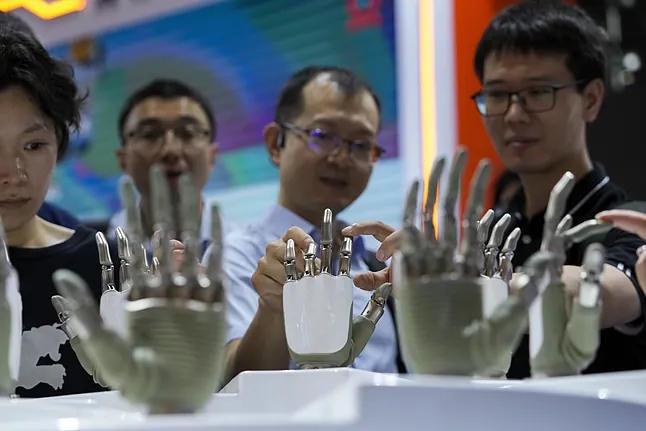In the endless avenues of Chinese technological mega-cities like Hangzhou, Shenzhen, and Shanghai, servers hum like steel beehives. From their depths emerge codes that learn, predict, and decide. The engineers, young and exhausted, live in an accelerated present where reality updates every dawn. Above them stands a state that craves a leading role in a new digital cosmogony.
China does not aim to compete in the current artificial intelligence race as a mere runner; it seeks to be an architect of something as grand as a global governance system so that AI serves humanity.
This was the proposal put forth last summer by the Chinese prime minister, Li Qiang, during the World AI Conference, an annual summit held in Shanghai with the participation of technological titans from over 40 countries. "Global governance of AI is still fragmented. Countries have significant differences, especially in areas like regulatory concepts and institutional standards. We must strengthen coordination to establish a global framework with broad consensus as soon as possible," Li stated just days after, from Washington, President Donald Trump revealed his administration's action plan to eliminate bureaucracy and ensure U.S. dominance in the sector.
"While the Trump administration issued a broad AI policy framework focused on deregulation and classic techno-nationalism, with AI as a tool for economic and geopolitical influence, China presented an inclusive initiative that demands international cooperation and multilateral standards," analyzes Elif Davutoglu, a researcher on AI governance policies.
The Chinese regime's proposal is to create a global organization, potentially based in Shanghai, to ensure international consensus on AI standards and norms. "This would help prevent monopolistic control by a few countries or corporations," stated the Chinese prime minister.
Some experts argue that while China and the U.S. are ahead in regulations, the European Union is hindered as it tries to apply its old and rigid regulations to a new and constantly changing reality, causing technological innovation to migrate to more permissive territories.
Within its borders, China has been articulating and implementing a strategy since 2017 to regulate and govern AI development, becoming the first country to implement binding regulations for specific applications, such as algorithm guidelines and content generation. "Chinese courts are increasingly adjudicating cases related to AI, especially in areas of copyright, data privacy, deepfakes, product security, and unfair competition," notes a recent analysis published in the journal Science on AI regulation being applied in the Asian country, where the government is actively working on a broader comprehensive law.
Over the past five years, according to data published by the Ministry of Industry and Technology, the number of Chinese AI companies has increased from just over 1,400 to over 5,000. The financial push from Xi Jinping's government is crucial in narrowing the technological gap with the U.S.: between 2013 and 2023, state-owned enterprises invested approximately $209 billion in AI-related businesses, while this year alone, public sector spending on AI is expected to exceed 400 billion yuan (around 50 billion euros). Additionally, as reported by the World Intellectual Property Organization, the Asian giant has been annually publishing more patents for generative AI inventions for eight years than all other countries combined.
Earlier this year, the unexpected emergence of the new open-source model from the Chinese startup DeepSeek shook global markets. Beijing boasted about it. However, their aspirations to become an AI leader clash with the prevailing censorship of the regime, which inevitably hinders their progress in this field. DeepSeek, for example, refuses to answer questions about content that the ruling Communist Party deems "sensitive."
A regulation from last year stated that, to release generative AI models to the public, providers "must filter out illegal or harmful content, including content that promotes extremism, violence, pornography, or incites subversion of state power." The CAC makes it clear that all AI-generated material must "respect core socialist values." In Beijing, high officials publicly defend that AI should serve the "common good" and be accessible to all, but they conveniently forget to mention that they are the first to block any model that does not bow to state censorship.
